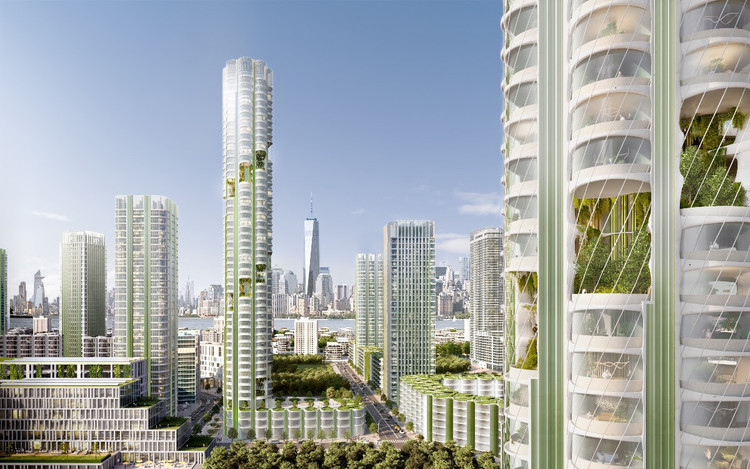
With the magnitude and urgency of the immediate Covid-19 crisis worldwide, efforts have been concentrated on saving lives, rather than focusing on concerns related to the road to Net-zero carbon. Net Zero carbon in regards to construction is defined as when the amount of carbon emissions associated with the construction of a building and its completion is zero. A zero-energy building will have an overall zero net energy consumption; the total amount of energy used by the building annually is equal to the amount of renewable energy generated on-site.
As the climate emergency presents itself as a severe and existential threat, it is crucial that the road to net-zero carbon is resumed large-scale in both an architectural and commercial sense. Around the globe, efforts have been renewed in an attempt to tackle the almost inconceivable. According to the 2019 global status report for buildings and construction, the buildings and construction sector accounted for 36% of final energy use and process-related carbon emissions in 2018. Although carbon emissions were temporarily reduced during the peak of the pandemic, they are set to swiftly return to previous figures.

In order to meet international commitments laid out by the 2015 Paris agreement, global emissions need to be slashed to net-zero by mid-century. In late 2021, the UK government set out its strategy for meeting net-zero carbon targets, a year later than expected due to the emergence of the Covid-19 catastrophe in early 2020. A topic of conversation that appeared hurried, a fortnight before the UK found itself in the COP26 UN climate talks in Glasgow, critics suggest that it lacks both ambition and sufficient funds to be carried out.
Plans including £3.9 billion in new funding for de-carbonizing heating and buildings and a further £500 million towards innovative new green technologies arrive perhaps a little too late in the eyes of some. The pandemic had delayed talks to such an extent that the outline may not be viable for completion by the 2050 target. The collapse of the Green Homes Grant, insulation scheme during 2021 has reinforced the idea that in regards to the UK the pandemic has hurried efforts to reduce carbon emissions.

Over 100 countries have already assumed carbon neutrality goals for 2050, yet the pandemic has interrupted supply chains around the world, disturbing renewable energy projects and delaying efforts in carbon reduction. Following COP26 the United Arab Emirates (UAE) was one of the first countries in the Middle East to announce its pledge for net-zero by 2050, striving to reduce carbon emissions by 23.5%. The use and distribution of clean energy solutions are foremost, investing in renewable energy ventures in 70 countries, focusing on developing nations. Despite critical economic decisions to recover from the pandemic, the UAE continues to back transformational investments for clean energy and is pioneering efforts for a greener future.

The pandemic dramatically damaged the clean energy transition, oil prices dropped considerably, and many fossil fuel companies temporarily closed their doors, leading to hefty bailouts and neglect in terms of support for renewables. Pandemic recovery should integrate clean energy transition, and follow the examples of Germany, Sweden, Japan, and South Korea, all of which have put a reduction in carbon emissions into law and are ahead in the race to net-zero emissions in 2022.
According to the report Are we Building back better? Evidence from 2020 and pathways for inclusive green recovery spending, the Covid-19 pandemic initiated a huge economic crisis, resulting in immense fiscal expenditure for recovery. What is interesting is the lack of green spending during this period which has delayed the race to net zero considerably. In terms of total spending, only 2.5% was announced for green initiatives and investment and has been driven by high-income nations. Many lower-income nations have not been able to prioritize green recovery, with the pandemic worsening global poverty and inequality. In order to build back better post-pandemic, and accelerate this betterment recovery must be inclusive and prioritize carbon neutrality.

Despite the vast setback, countries including Suriname and Bhutan have become the first two countries to achieve carbon neutrality, and have become carbon negative, (removing more carbon emissions than they manage to emit). This offers some optimism in regards to re-establishing the road to Net-Zero carbon, with Uruguay soon to follow in 2030. At this moment in time, 99 of the 137 global pledges are only under discussion and are not set in legislation, this is astonishing considering the urgency of the situation. The pandemic may have held some responsibility in terms of this delay, yet pledges must be set in stone in order to reduce carbon emissions before it is significantly too late.
This article is part of the ArchDaily Topics: The Road to Net Zero Architecture presented by Randers Tegl.
Randers Tegl aims to take responsibility and think sustainable as a part of reaching the goal of Net Zero. Both in terms of how building materials impact the climate and how the materials age, but also with a focus on architecture. That is why Randers Tegl created their sustainable series GREENER, which comes with full documentation in the form of EPD, so it is possible to use the product in technical calculation programs.
Every month we explore a topic in-depth through articles, interviews, news, and projects. Learn more about our ArchDaily topics. As always, at ArchDaily we welcome the contributions of our readers; if you want to submit an article or project, contact us.







